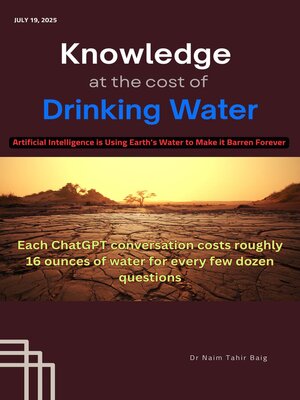
Sign up to save your library
With an OverDrive account, you can save your favorite libraries for at-a-glance information about availability. Find out more about OverDrive accounts.
Find this title in Libby, the library reading app by OverDrive.



Search for a digital library with this title
Title found at these libraries:
| Library Name | Distance |
|---|---|
| Loading... |
Book Description
In the gleaming data centers powering our AI revolution, a hidden crisis is unfolding. While we marvel at ChatGPT's ability to answer any question and AI's power to generate stunning images, few realize the staggering environmental cost: every conversation consumes roughly 16 ounces of fresh water, and by 2030, AI could be consuming as much water daily as millions of human beings.
Knowledge at the Cost of Drinking Water exposes the shocking truth behind artificial intelligence's insatiable thirst. Dr. Naim Tahir Baig takes readers on a gripping investigative journey from West Des Moines, where Microsoft's data centers consume 11.5 million gallons monthly while residents face lawn watering bans, to drought-stricken Uruguay, where Google's cooling towers would consume 7.6 million liters daily during the country's worst drought in 74 years.
Through meticulous research and powerful storytelling, this groundbreaking investigation reveals how Big Tech companies—Microsoft, Google, Meta, and others—have quietly built their AI infrastructure in the world's most water-stressed regions while hiding consumption data behind trade secret claims. The book documents a thirteen-month legal battle between The Oregonian newspaper and Google, which spent over $100,000 fighting to keep water usage secret, only to suddenly reverse course and reveal consumption that dwarfs entire city supplies.
Dr. Baig exposes the illusion behind corporate "water positive" pledges, showing how Microsoft's emissions rose 30% despite net-zero commitments, and how Google's water replenishment projects cover only 18% of actual consumption. The book reveals how AI's water usage has increased 60% since 2020, with projections reaching 1,200 billion liters annually by 2030—enough to supply tens of millions of people.
From environmental justice communities bearing the brunt of data center pollution to international protests in Chile, Netherlands, and Spain, this investigation humanizes a crisis that threatens to pit technological progress against basic human survival. Yet it also illuminates hope through emerging solutions: zero-water cooling technologies, community organizing victories, and a growing movement for corporate transparency and accountability.
Combining rigorous journalism with accessible storytelling, Knowledge at the Cost of Drinking Water is essential reading for anyone seeking to understand the true cost of our digital future. As Dr. Baig demonstrates, the choice before us is clear: we can continue enabling an AI boom that consumes the water needed for human survival, or demand sustainable development that serves both technological progress and planetary health. The decision we make will determine whether future generations inherit a world of endless knowledge or endless thirst.







